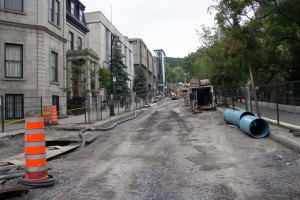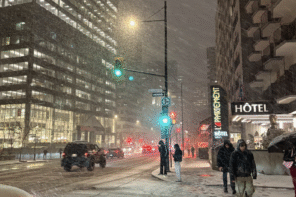Construction on McTavish Street has sparked frustration as students returned from summer term to a torn up project site running through campus. The repairs, led by the City of Montreal, will replace old supply pipes and install new storm drains. Amidst safety cautions sent to students in an MRO and a small pipe break during construction last Friday, the outlook appears grim. However, with the space listed as a promenade urbaine in honor of Montreal’s 375th anniversary, the project provides an opportunity to transform McTavish Street into a green and sustainable walking space in years to come.
The initiative, part of a renewal plan being implemented by the City of Montreal, is dedicated to addressing infrastructure issues underneath McTavish Street. In addition, storm drains are being installed in the event of another flood such as those of both 2013 and 2012, when pipes located in the Reservoir ruptured during a separate construction project.
Anton Buteau-Protz, a Utilities Manager at McGill acting as a liaison between the City of Montreal and the university, clarified: “The project is not directly related to the floods, though the issue was raised early on in the process. The drainage is being redone throughout the streets, so this should take care of the problem if it happens again.”
Delays in the construction occurred early on due to complications with the 100-year-old pipes and ground composition. As Buteau-Protz explained, “I’m not aware of all of the specifics but it has been hard to estimate all of the elements encountered in the project.”
With the Commission de la construction du Québec (CCQ) mandated holiday scheduled from July 20 to August 2, the project did not have ample time to recover from the initial setback to be completed before the start of the academic year. Buteau-Protz, however, assured that though a definite date cannot be set, the project is on track for October as the workers are now actively catching up.
A City of Montreal project comes to McGill
The City of Montreal has cooperated with McGill to coordinate the project around several university events and to provide major updates. Buteau-Protz, one of two liaisons between the university and the city, stated that he was satisfied with the level of communications on both sides even though the university did not have much of a role in managing the project.
“Obviously we would always like to be more involved with such projects considering we are occupants in the surrounding area. We’ve been involved with major communications and they’re open to our requests… however, we cannot make any decisions,” explained Buteau-Protz.
The Students’ Society of McGill University (SSMU) has made several accommodations to address the impact of the construction on SSMU events such as Street Fest, Activities Night, the Farmers’ Market, and on-campus Frosh activities. Despite this, SSMU has been pleased overall with the level of communication exchanged with the university. “I believe that efforts are really being made to minimize inconvenience to members of the community as much as possible,” explained VP External Amina Moustaqim-Barrette. “Still, the construction was projected to finish at the end of August, and it is always frustrating when deadlines continue to be pushed back.”
Due to the nature of the project as one coordinated by the city, McGill does not have to directly fund any of the current construction. However, there have been indirect costs to the university. “If we have a special event that requires cleaning we have to hire our own grounds people. On a financial level, the city will not reimburse us for these activities and we have to provide our own services. However, this is completely normal,” elaborated Buteau-Protz.
A Second Initiative
Under McGill’s direction in May 2010, McTavish Street transitioned into a pedestrian zone by limiting service truck and car access to the lower part of the road. To accommodate this transition, the City of Montreal in collaboration with McGill added planters, bike racks and other elements to make the space a positive commuting zone. Now, as these efforts are torn up with the road, McGill’s Office of Sustainability, Office of Design Services, and Office of Campus and Space Planning, along with groups such as Vision 2020, are once again working to make the area pedestrian friendly.
In Vision 2020’s “Sustainability Strategy within McGill: Priority Action Briefs for 2014- 2016,” a “Sustainable McTavish” was listed as action number 7. The document recognized this construction project as an opportune moment to act and stated that, “the University will ensure that the corridor is welcoming to pedestrians, serves as a center for community activity, and incorporates best practices in sustainable urban planning and design.”
However, this project would come as a separate bid from the current one being conducted by the city. “I think it is very positive,” explained Buteau-Protz. “However, the actual project on the site right now is not a phase. We must look at it as two different departments and projects within the city. There is no dependency of one on the other for now.”
The effort to make McTavish more sustainable would be a part of the City of Montreal’s Urban Walks initiative for the city’s 375th anniversary. The idea is “based on a desire to combine urban and biodiversity in order to increase the quality of life for citizens living in the densest city neighbourhoods, and in everyday life,” as stated on the project’s website.
Moustaqim-Barrette expressed her involvement in the project through the Office of Sustainability and Vision 2020, and hopes to represent the student voice as the initiative moves forward by sitting on the Senate Committee on Physical Development (SCPD).
“Though I personally believe that having a bike-friendly, greener, and more community-focused campus would be beneficial both to students and members of the wider Montreal community, and that having a campaign to push these ideas forward would be ideal, I will not move forward before reaching out and consulting as many students as possible on this topic,” she clarified.
As the project moves into it’s final stages, Moustaqim-Barrette would like to remind students to be attentive when walking by the site and to read the posted signs.









